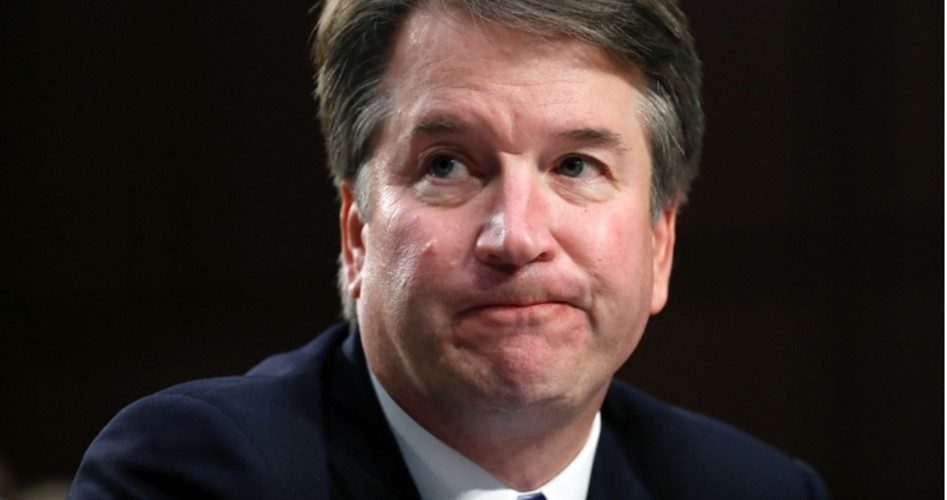
Christina Blasey Ford, who accuses Supreme Court nominee Brett Kavanaugh (shown) of attempted rape at a party in 1982, will testify before the Senate Judiciary Committee.
But not until Thursday.
Meanwhile, the committee has heard from another woman whom Ford claimed was at the party. That witness says she has no recollection of the party.
Grassley Caves
Grassley had told Ford that she had until 10 a.m. Friday to respond to the committee’s request for testimony. Ford and her leftist attorney, Debra Katz, refused, adding the preposterous claim that Republicans were “bullying” the woman who had, only days before, agreed to testify. Only the time and conditions of the testimony were left to discuss. But Monday was too soon, Ford said.
Grassley caved on the deadline and moved it to Saturday at 2:30 p.m. Apparently that was enough time. Ford agreed to appear on Thursday, the New York Times reported, three days past Grassley’s original demand. Monday was the day, he warned, the committee would vote on Kavanaugh.
One of Ford’s excuses for the delay was that she is claustrophobic and fears flying and must drive or take the train from California.
Shockingly, Grassley not only permitted Ford’s attorney to control when Ford would testify, but also surrendered the right to control the hearing itself, as the Times reported: “While the negotiations over Dr. Blasey’s testimony seemed to gain momentum, they could still falter over the details, which include who will question her.”
Reported the Times:
But in tentatively agreeing to a Thursday hearing, Republicans made a significant concession that suggested they were working to ensure that the session occurred after several days of uncertainty.
If no final deal is made, Mr. Grassley will be left to decide on Sunday whether to move ahead with a committee vote on Judge Kavanaugh’s nomination that is scheduled for Monday, or give Dr. Blasey more time. Judge Kavanaugh, who has vigorously denied the allegations, has repeatedly expressed his desire to testify.
Another Witness Contradicts Ford
One question Ford must answer is why not one of the four others she says were at the party do not support her claim.
The latest, CNN divulged yesterday, is Ford’s lifelong friend, Leland Ingham Keyser. A staff member of the Judiciary Committee asked her this question: “I understand that you have been identified as an individual who was in attendance at a party that occurred circa 1982 described in a recent Washington Post article.”
Keyser’s attorney answered: “Simply put, Ms. Keyser does not know Mr. Kavanaugh and she has no recollection of ever being at a party or gathering where he was present, with, or without, Dr. Ford.”
Ford’s feminist attorney, a hard-core radical who toils for an organization subsidized by leftist billionaire George Soros, was ready for that one, CNN reported: “It’s not surprising that Ms. Keyser has no recollection of the evening as they did not discuss it,” Katz said. “It’s also unremarkable that Ms. Keyser does not remember attending a specific gathering 30 years ago at which nothing of consequence happened to her. Dr. Ford of course will never forget this gathering because of what happened to her there.”
That would be more plausible if putative witness P.J. Smyth hadn’t also denied being at the party, as did Mark Judge, whom Ford claims interrupted Kavanaugh’s attack. And, of course, Kavanaugh denies his accuser’s cloudy claim unreservedly.
Ford’s Demand Is Ludicrous
The problem with the whole affair, law professor Jonathan Turley wrote for The Hill, is that Ford’s demands are and were ridiculous, including her mandate the FBI investigate before she testifies.
“Ford’s demand is, to put it simply, out of line, both with her prior statements and with congressional precedent,” he wrote. “There is no precedent for a quid pro quo demand for testimony by a witness. Individuals can certainly refuse to testify, yet conditioning testimony on a criminal investigation by a federal agency is well beyond the province of any witness.”
Beyond that, he wrote, “while Democrats have insisted Ford has a ‘right to be believed,’ there are basic principles of due process that establish a right to be heard, not a right to be believed. Kavanaugh categorically denies these allegations; he has no less and no more right to be believed.”
Photo of Brett Kavanaugh: AP Images

